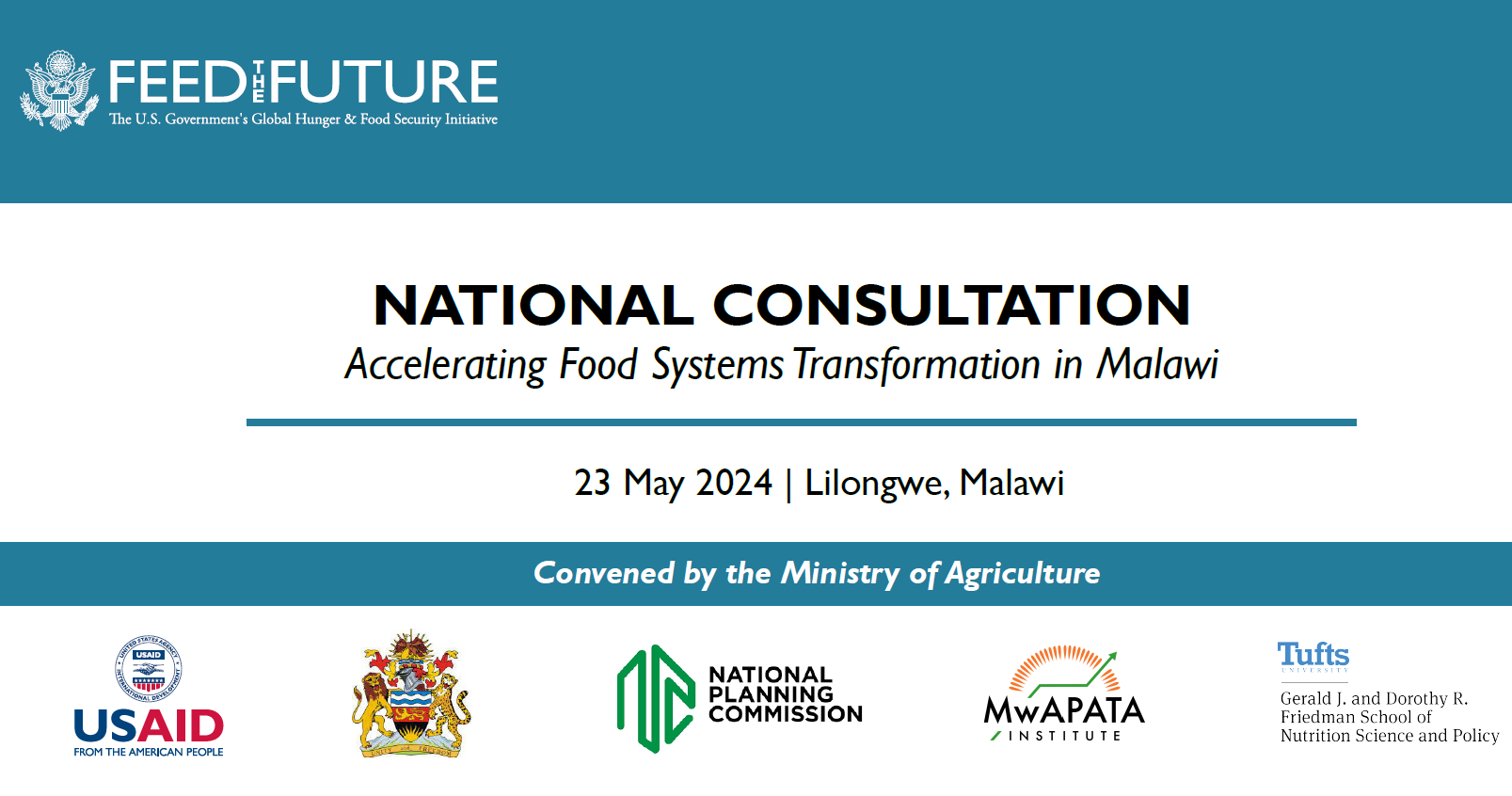
- This event has passed.
National Consultation: Accelerating Food Systems Transformation in Malawi
May 23, 2024 @ 8:00 am - 5:00 pm

In 2019, the United Nations (UN) Secretary General called for a global summit on the future of food systems. This UN 2021 Food Systems Summit (UNFSS) (hereafter called the “summit”) took place in Rome in September 2021. The summit was underpinned by an inclusive engagement process to deliver progress on all 17 UN Sustainable Development Goals (SDGs). It also recognized the significance and complexity of food systems around the world and offers an opportunity to identify pathways towards sustainable national food systems contributing to the achievement of the SDGs.
In preparation for this global summit, a diverse range of stakeholders from all Member States – from Government to Members of Parliament (MP), from youth activists to traditional leaders, from smallholder farmers to scientists, the academia and private sector – were called to identify the most impactful ways to make food systems stronger and more equitable. A synthesis report of the Food Systems dialogue was developed from the consultations and presented at the Global Summit.
Following the summit, Malawi planned to operationalize the priority aspirations and actions as expressed in the national food systems pathway report following the dialogue process. As an appointed convenor of the food systems dialogue in the country, the Ministry of Agriculture in collaboration with Food Systems stakeholders in the country developed a road map that culminated into action tracks and pathways to operationalize the road map, focused on food security, nutritional and health, environmental sustainability, social economy, and territorial balance. The National Food Systems Pathways report has five Action Tracks covering a diverse range of key focus areas for the food systems transformation in Malawi through various pathways or strategies.
A food systems strategy and investment plan has also been put together as part of kick-starting the operational aspects of the food systems programming in the country. However, progress on the operationalization of the pathways and the investment plan strategic areas is not clearly known, despite the involvement of numerous stakeholders. This lack of consolidated information and updates from the various stakeholders impedes the accurate monitoring of progress towards addressing the challenges inherent in Malawi’s food system.
To address this gap, the Ministry of Agriculture in collaboration with the National Planning Commission, and with support from the Feed the Future Food Systems for Nutrition Innovation Lab (FSN-IL) at Tufts University and MwAPATA Institute, organized five Food Systems Action-Track dialogue sessions to take stock of the progress made so far in implementing the Food Systems program in Malawi, understand the key challenges, propose recommendations, and map the way forward. The dialogue sessions were held from April 23-25, 2024 at Sigelege Hotel in Lilongwe.
The report developed from the dialoguea were used to develop the program agenda for the National Consultation. The consultation aimed to own the reflections from the dialogues and define the next steps for accelerating food systems across all action tracks. Participants were tasked with identifying and prioritizing the actions needed and mapping out the way to achieve them.
Workshop Goals
The main objective of the planned National Consultation on the Acceleration of Food Systems Transformation is to build on the momentum generated from Malawi’s national pathways for food systems transformation in building healthier, sustainable, and equitable food systems for a better Malawi. The consultation will discuss and address the following issues:
- Coordination and Collaboration: Facilitate a platform for stakeholders involved in various aspects of the food system to discuss coordination mechanisms in the operationalization of efforts towards transforming Malawi’s food systems.
- Knowledge Sharing: Create a space for an exchange of innovative knowledge, evidence, best practices, and lessons learned from ongoing food systems initiatives across Malawi to achieve its medium and long-term development plans.
- Policy Alignment and Governance: Encourage dialogue to ensure alignment and coherence among multi-sectoral policies, ministries, and initiatives related to food systems at the regional, national, and sub-national levels.
- Inclusive Engagement: Promote inclusive engagement by involving government officials, policymakers, development partners, the private sector, researchers, academics, industry representatives, small and medium enterprises, civil society, and organizations at the grassroots.
